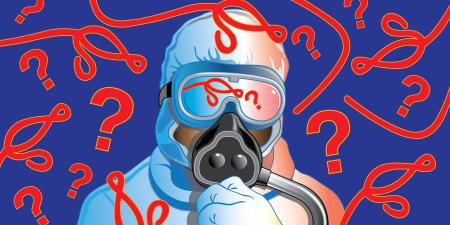Abstract
Ethical and logistical challenges of deploying experimental vaccines in humanitarian emergencies are exacerbated by a paucity of safety and efficacy data. For outbreaks caused by pathogens with high mortality rates and few treatments, such as Ebola virus disease, not offering access to experimental vaccines with some evidence of efficacy can also be ethically suspect. This article recommends (1) gathering more preclinical data about experimental vaccines’ safety and (2) improving research infrastructure to enable participation of a wide range of subjects in affected communities over long trial periods. Motivating these goals would facilitate clearer definitions of population vulnerability and risk acceptability.
Risk of Disease vs Risk of Experimental Vaccination
Safe and effective vaccination programs are critical to mitigating disease outbreaks, but vaccine deployment can be fraught with logistical challenges and ethical questions that vary with the environments in which programs are implemented. Effectively deploying experimental vaccines for emerging infectious diseases relies on policy and research infrastructure to ensure safe, ethical research during emergencies. The complexity of these challenges was apparent during the management of recent Ebola virus disease (EVD) epidemics. At the time of the 2013-2016 West African outbreak, effective management was hampered by, among other things, a lack of licensed vaccines and treatments to deploy to control EVD.1,2 In the midst of global community members’ push to initiate clinical trials for experimental vaccines and therapeutics, discussions arose about which criteria should be used to distribute experimental vaccines among vulnerable groups, particularly those in resource-limited settings.3 The current North Kivu EVD outbreak in the Democratic Republic of the Congo (DRC) suggests a continuing need to consider distribution criteria and to develop strategies for anticipating and addressing ethical and logistical questions.
During recent EVD outbreaks, whether experimental recombinant vesicular stomatitis virus-based vaccine (rVSV-ZEBOV) should be used in pregnant and lactating women and in children under one year of age has raised ethical questions. During the 2013-2016 West African Ebola epidemic, members of these populations were excluded from Ebola ça Suffit! trials.4 Although the World Health Organization (WHO) Research Ethics Review Committee guided implementation of trials during that outbreak and requested amendments to the protocol to include members of these populations as subjects, it later relented, as further review was seen as delaying trial initiation and “potential benefit for all.”5 In 2019, the DRC National Ethics Committee approved inclusion of pregnant or lactating women and children in a large experimental rVSV vaccination campaign that was underway but required close follow-up and limited distribution to areas where Ebola was being actively transmitted.6 This committee’s decision highlights that comparing vulnerable community members’ risk of harm from EVD to their risk of harm from rVSV tends to be considered in decisions about whether, where, and with whom to use experimental vaccines.
A first question to ask about experimental vaccine administration among vulnerable populations in emergent situations is this: How should the concept of vulnerability be defined? Individual, social, cultural, and scientific variables should be prioritized in a definition of this concept and considered with reference to a specific situation or circumstance. We argue that members of vulnerable populations can more safely participate in experimental vaccine trials that (1) gather preclinical data and (2) bolster research infrastructure that enables diverse enrollment and long-term follow-up.
Defining Vulnerability
In research ethics, a vulnerable population is generally thought to be one whose members’ ability to consent to participate in a research protocol is compromised (eg, through lack of competency, illiteracy, poverty, or inability to communicate). A Canadian Tri-Council Policy Statement (TCPS2) more generally defines vulnerability as “diminished ability to fully safeguard one’s own interests in the context of a specific research project” due to “limited decision-making capacity or limited access to social goods, such as rights, opportunity, and power.”7 Vulnerability “may require greater effort to minimize risks to participants and/or maximize potential benefits” in order that they be treated justly.8
More often than not, members of populations considered vulnerable are excluded from clinical trials.
Applying this definition of vulnerability responsibly requires considering that observers can differ in their perceptions of a subject’s moral agency.9 For example, during an outbreak, individuals or communities might not perceive themselves as vulnerable, although regulatory bodies or health care organizations do, and vice versa. Moreover, simply identifying characteristics that confer “vulnerability” can also be challenging largely because they can consist of both individual traits—including young age, ethnicity, race, gender, or general or mental health status—and particular contexts that apply to an entire community.
How we define vulnerability shapes how those seen as vulnerable are treated and influences opportunities they are offered. As examples, the Ebola ça Suffit! trial prioritized vaccination for subjects exposed to the virus who were not pregnant, breastfeeding, or severely ill; other trials have included health care workers as subjects, excluding pregnant or lactating women.4 More often that not, members of populations considered vulnerable are excluded from clinical trials.10 Although pregnant women tend to suffer high mortality from EVD,11 they and members of other groups have been excluded from clinical EVD trials.11 Recently, there has been a shift toward not labeling populations as vulnerable,11,12 but removing protections justly and equitably requires input and buy-in from members of these populations, which is difficult to accomplish during an outbreak.
EVD outbreaks have occurred—and continue to occur—in settings fraught with armed conflict and displacement,14 which exacerbate individuals’ and communities’ vulnerability. Postconflict food insecurity and lack of health care infrastructure in West Africa likely heightened susceptibility to EVD during the 2014 epidemic and helped propagate it.15,16 These conditions persist in the ongoing epidemic in the DRC, where conflict has made tracing contacts difficult, complexified vaccine investigation, and led some to switch to mass vaccination strategies. Such factors must contextualize how we define and understand concepts such as vulnerability and even emergency, which the WHO defines as the co-existence of outbreak along with either a man-made or natural condition that could cause disruption to health care services.17 Since context can be dynamic, the process of defining key concepts should also be dynamic. Therefore, international and local agencies should develop close relationships with communities to keep abreast of geopolitical shifts that might influence assessments of vulnerability.
The state of medical science related to emerging diseases like EVD also matters to how vulnerability is defined. A change in clinical standards of care for a particular disease that alters the risk-benefit profile used in individuals’ and agencies’ decision making should also be regarded as a key variable in understanding and defining vulnerability. For example, populations’ susceptibility to EVD during the 2013-2016 epidemic largely hinged on lack of alternatives to experimental drugs to prevent and treat EVD, which likely affected subjects’ decision making about whether to participate in trials. New therapeutic and investigational vaccines have emerged since then,18 which have altered risk-benefit profiles of communities undergoing an epidemic and will likewise critically shape conceptions of vulnerability. The changing medical context suggests the importance of determinations of vulnerability being made and reassessed continuously by regulatory committees or global health organizations with regular input from affected communities.
Inclusion and Safety
Several reports, including a recent review by the Pregnancy Research Ethics for Vaccines, Epidemics, and New Technologies (PREVENT) Working Group, highlight how exclusion of vulnerable groups, including pregnant women and children, from research can result in their not having access to experimental vaccines during emergencies.19 This report’s key recommendations for including pregnant women in vaccine research set good milestones to follow for research with other vulnerable populations, however defined in a particular situation.
- Gather preclinical data on safety of experimental vaccine use in vulnerable populations. The PREVENT group recommends using advanced technology to study immune responses of pregnant women and children and recommends creation of market incentives to include vulnerable subgroups in research.19 These efforts should also seek to augment knowledge about use of experimental vaccines in persons with HIV and highly prevalent co-infections that might lead to biological vulnerability to disease.6
- Enable safe enrollment of vulnerable subjects in vaccine trials during crises. Reports have stressed the importance of building surveillance and health information systems to allow improved capture of the outcomes of experimental vaccine deployment, particularly in vulnerable populations.19,20 Aside from strengthening national health systems, building research capacity in countries where Ebola and other pathogens on the WHO’s priority diseases list pose risk can motivate safe deployment of experimental vaccines during outbreaks.21 A review of clinical trials conducted during the 2013-2016 EVD epidemic by a committee of the National Academies of Sciences, Engineering, and Medicine suggests the importance of long-standing research engagement to enable timely deployment of investigational agents in communities at risk.22
- Cultivate long-term, trusting relationships. The WHO has developed a framework for ethical decision making concerning use of experimental vaccines during emergencies.17,23 In addition, perceptions of risks and benefits of groups considered to be vulnerable should inform community participation strategies. One recent study found that many subjects in an Ebola vaccine trial were motivated by altruism, curiosity, hope, health seeking, and notions of exchange.24 Understanding the role of these values in subjects’ decisions about whether to enroll in a protocol suggest that engagement with local leaders and decision makers is key when discussing experimental vaccine deployment in an emergency and is critical for motivating trust. Due to mistrust, 2 Ebola vaccine trials were suspended in Ghana.25
Conclusions
Ethical questions about deploying experimental vaccines during recent and ongoing EVD outbreaks are complex and multifaceted and require attention to dynamic context. Navigating collaborative responses to these questions is aided by contextualizing definitions of vulnerability and emergency; preparedness; nourishing ongoing and sustainable partnerships with people in local communities where outbreaks tend to recur, including through developing trusting communication; and investing in research infrastructure.
References
-
Kaner J, Schaack S. Understanding Ebola: the 2014 epidemic. Global Health. 2016;12(1):53.
-
Cenciarelli O, Pietropaoli S, Malizia A, et al. Ebola virus disease 2013-2014 outbreak in West Africa: an analysis of the epidemic spread and response. Int J Microbiol. 2015;2015:769121.
-
World Health Organization. (WHO) Ethical considerations for use of unregistered interventions for Ebola viral disease: report of an advisory panel to WHO. https://apps.who.int/iris/bitstream/handle/10665/130997/WHO_HIS_KER_GHE_14.1_eng.pdf;jsessionid=6AD0D5B55A7075578987E69693C22B7C?sequence=1. Published 2014. Accessed November 11, 2019.
- Henao-Restrepo AM, Camacho A, Longini IM, et al. Efficacy and effectiveness of an rVSV-vectored vaccine in preventing Ebola virus disease: final results from the Guinea ring vaccination, open-label, cluster-randomised trial (Ebola Ca Suffit!). Lancet. 2017;389(10068):505-518.
-
Alirol E, Kuesel AC, Guraiib MM, de la Fuente-Nunez V, Saxena A, Gomes MF. Ethics review of studies during public health emergencies—the experience of the WHO ethics review committee during the Ebola virus disease epidemic. BMC Med Ethics. 2017;18(1):43.
-
Strategic Advisory Group of Experts (SAGE) on Immunization. SAGE interim recommendations on vaccination against Ebola virus disease (EVD). https://www.who.int/immunization/interim_ebola_recommendations_feb_2019.pdf. Published February 20, 2019. Accessed November 11, 2019.
-
da Silva RE, Amato AA, Guilhem DB, de Carvalho MR, Lima EDC, Novaes M. Factors contributing to exacerbating vulnerabilities in global clinical trials. Front Pharmacol. 2017;8:999.
-
Canadian Institutes of Health Research; Natural Sciences and Engineering Research Council of Canada; Social Sciences and Humanities Research Council of Canada. Tri-Council Policy Statement: Ethical Conduct for Research Involving Humans. http://www.frqnt.gouv.qc.ca/documents/10191/186009/TCPS2.+pdf/6a8ab915-431b-428d-aa86-b22ca5c78053. Published 2014. Accessed October 8, 2019.
- Levine C, Faden R, Grady C, et al. The limitations of “vulnerability” as a protection for human research participants. Am J Bioeth. 2004;4(3):44-49.
- Spong CY, Bianchi DW. Improving public health requires inclusion of underrepresented populations in research. JAMA. 2018;319(4):337-338.
-
Gomes MF, de la Fuente-Núñez V, Saxena A, Kuesel AC. Protected to death: systematic exclusion of pregnant women from Ebola virus disease trials. Reprod Health. 2017;14(suppl 3):172.
- van der Zande ISE, van der Graaf R, Oudijk MA, van Delden JJM. Vulnerability of pregnant women in clinical research. J Med Ethics. 43(10):657-663.
-
Task Force on Research Specific to Pregnant Women and Lactating women, US Department of Health and Human Services. Report to Secretary, Health and Human Services, Congress. https://www.nichd.nih.gov/sites/default/files/2018-09/PRGLAC_Report.pdf. Published September 2018. Accessed November 11, 2019.
-
McPake B, Witter S, Ssali S, Wurie H, Namakula J, Ssengooba F. Ebola in the context of conflict affected states and health systems: case studies of Northern Uganda and Sierra Leone. Confl Health. 2015;9:23.
-
Stanturf JA, Goodrick SL, Warren ML Jr, Charnley S, Stegall CM. Social vulnerability and Ebola virus disease in rural Liberia. PloS One. 2015;10(9):e0137208.
-
Coltart CE, Lindsey B, Ghinai I, Johnson AM, Heymann DL. The Ebola outbreak, 2013-2016: old lessons for new epidemics. Philos Trans R Soc Lond B Biol Sci. 2017;372(1721):20160297.
-
World Health Organization. Vaccination in Acute Humanitarian Emergencies: A Framework for Decision Making. https://apps.who.int/iris/bitstream/handle/10665/255575/WHO-IVB-17.03-eng.pdf?sequence=1. Published May 2017. Accessed November 11, 2019.
-
Dhama K, Karthik K, Khandia R, et al. Advances in designing and developing vaccines, drugs, and therapies to counter Ebola virus. Front Immunol. 2018;9:1803.
-
Krubiner CB, Faden RR, Karron RA, et al. Pregnant women and vaccines against emerging epidemic threats: ethics guidance for preparedness, research, and response [published online ahead of print May 3, 2019]. Vaccine.
- Jacobsen KH, Aguirre AA, Bailey CL, et al. Lessons from the Ebola outbreak: action items for emerging infectious disease preparedness and response. Ecohealth. 2016;13(1):200-212.
-
World Health Organization. Prioritizing diseases for research and development in emergency contexts. https://www.who.int/blueprint/priority-diseases/en/. Updated February 6, 2018. Accessed July 18, 2019.
-
Keusch G, McAdam KPWJ, Cuff PA, Mancher M, Busta ER, eds; National Academies of Sciences, Engineering, and Medicine. Integrating Clinical Research into Epidemic Response: The Ebola Experience. Wasington, DC: National Academies Press; 2017.
- Moodley K, Hardie K, Selgelid MJ, et al. Ethical considerations for vaccination programmes in acute humanitarian emergencies. Bull World Health Organ. 2013;91(4):290-297.
-
Tengbeh AF, Enria L, Smout E, et al. “We are the heroes because we are ready to die for this country”: participants’ decision-making and grounded ethics in an Ebola vaccine clinical trial. Soc Sci Med. 2018;203:35-42.
-
Kummervold PE, Schulz WS, Smout E, Fernandez-Luque L, Larson HJ. Controversial Ebola vaccine trials in Ghana: a thematic analysis of critiques and rebuttals in digital news. BMC Public Health. 2017;17(1):642.



